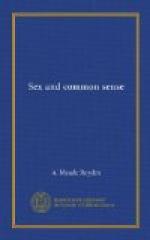I want then to combat with all my power this ancient but un-Christlike belief that women miss their object in life if they are not wives and mothers. It may seem something of a contradiction that I should in a previous chapter so have emphasized the need of women for the satisfaction of their sexual nature, and now be arguing that we must not assume that they have no right to exist if they do not meet this particular satisfaction; but I think you will realize that it is not a paradox when I ask you to consider for a moment what your attitude to men on this subject is. Many people hold that a man’s passions are a tremendous factor in his existence, so strong that he must always be forgiven if he cannot control them; so strong that, on the whole, it is hardly to be expected that he should control them. But yet, if a man does not marry, or if there are more men than women in a certain country—as, for instance, in Australia, or Western Canada to-day—nobody speaks of those men as though they were “superfluous,” as though they had ceased to have any real object for existence. People will realize that it is a hardship—a very great hardship—in their lives; they will be apt to excuse them for taking what they can get if they cannot get everything; but no human being talks of the “superfluous men” in any of our great Dominions. People always realize that a man has a human value, and that, however great the urgency of the sex side of him, he still is a human being, he still has his value in the world, even supposing that he should live and die celibate. If you will try to put your mind into that attitude towards women, you will, I think, see that it is not a paradox to say that a woman may and does suffer if she does not fulfil the whole of her nature, and yet that it is a monstrous fallacy to affirm that, because of that, she ceases to have any reason for existence; that she is a futile life, a person who does not really “count.” Sex is a great and a mighty power, but it is something more than the mere satisfaction of a physical need. It is part of the great rhythm of life, running through all the higher creation; it is the instinct to create, going forth in the power of love, proving to us day by day that only love can create, bringing us nearer to the Divine Power, Who is Love, and Who created the heaven and the earth. In spite of our horrible thoughts about sex, our hideous sins against it, I do not think that in anything God has made man more “in His image and likeness” than when He gave him the power, through love, to create life. That is a power that makes us akin to God Himself, and the instinct of sex is not a grimy secret between two rather shamed human beings, but a great impulse of life and love—yes, even, at the height of it, an instinct to sacrifice in order that life may come into the world; it is a great bond of union between human beings; it is the secret of existence, the secret of the meaning of life; that




